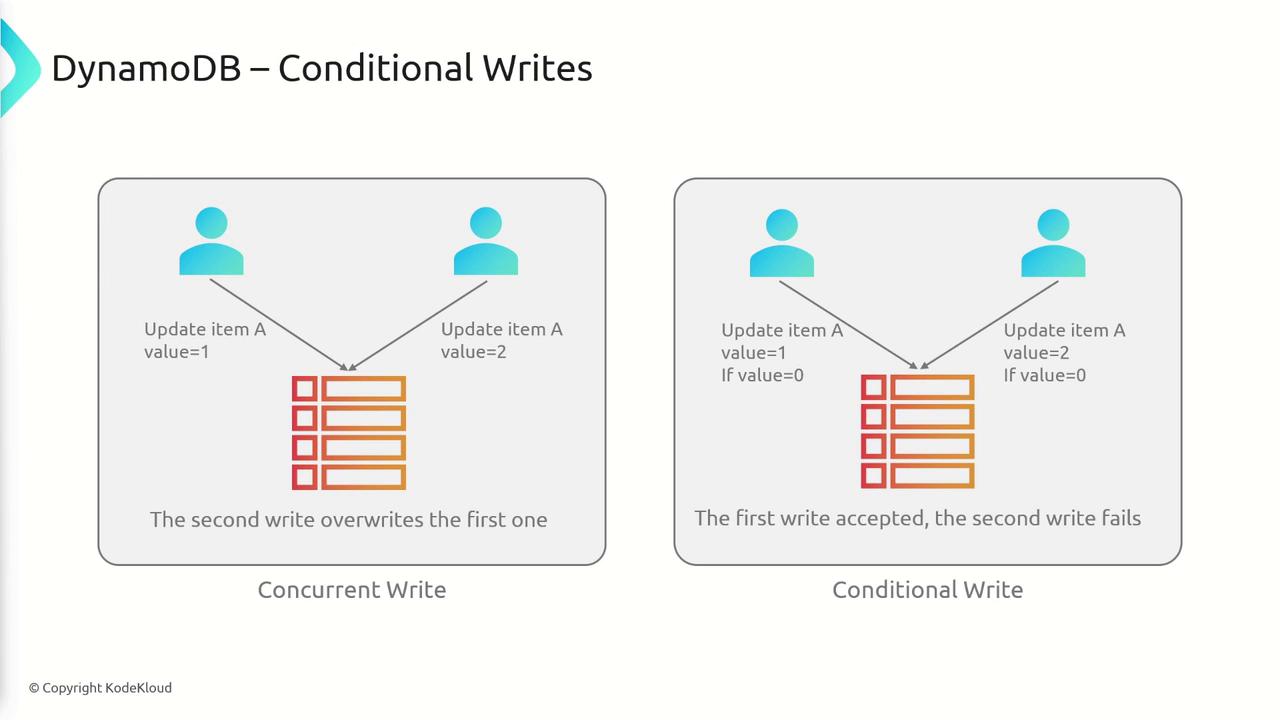AWS Certified Developer - Associate
Databases
DynamoDB Conditional writes
In this article, we explore how DynamoDB Conditional Writes help maintain data integrity by allowing write operations to be executed only when specified conditions are met. Conditional writes are particularly useful in scenarios where multiple users attempt to update the same item simultaneously. For instance, if User 1 tries to update item A to 1 and User 2 tries to update item A to 2 at the same time, the second operation might overwrite the first. With conditional writes, you can enforce a check—such as updating only if the current value is 0—thereby preventing unintended overwrites and ensuring consistency.

DynamoDB Conditional Writes can be applied across several API calls, including PutItem, DeleteItem, UpdateItem, BatchWriteItem, and more. The database supports various conditional expressions, such as:
- attribute_exists
- attribute_not_exists
- attribute_type
- begins_with
- contains
- size
Below, we provide detailed examples and code snippets to help you understand and implement these conditional expressions.
Using Conditional Writes
Before using conditional writes, make sure to evaluate your application's concurrency needs to avoid conflicts when multiple writes occur at the same time.
Attribute Existence Check
The attribute_exists condition verifies whether a particular attribute exists in an item. For example, to delete an item only if the attribute ProductReviews.OneStar exists, use the following command:
aws dynamodb delete-item \
--table-name ProductCatalog \
--key '{"id": {"N": "456"}}' \
--condition-expression "attribute_exists(ProductReviews.OneStar)"
Conversely, you can use attribute_not_exists to ensure that an operation is executed only when a specified attribute does not exist. The following command deletes the item only if the Price attribute is absent:
aws dynamodb delete-item \
--table-name ProductCatalog \
--key '{"id": {"N": "456"}}' \
--condition-expression "attribute_not_exists(Price)"
Attribute Type Check
The attribute_type expression ensures that an attribute is of a specific type. For example, if you have an attribute named Color and want to ensure it is stored as a string, execute the following command:
aws dynamodb delete-item \
--table-name ProductCatalog \
--key '{"Id": {"N": "456"}}' \
--condition-expression "attribute_type(Color, :v_sub)" \
--expression-attribute-values file://expression-attribute-values.json
Create the accompanying JSON file named expression-attribute-values.json with the following content:
{
":v_sub": {"S": "SS"}
}
If the Color attribute is of type String, the condition evaluates to true, and the delete-item operation is executed.
String Expressions: begins_with and contains
begins_with Expression
The begins_with function checks if a string attribute starts with a specific substring. For example, to delete an item only when the attribute Pictures.FrontView begins with "http://", use this command:
aws dynamodb delete-item \
--table-name ProductCatalog \
--key '{"Id": {"N": "456"}}' \
--condition-expression "begins_with(Pictures.FrontView, :v_sub)" \
--expression-attribute-values file://expression-attribute-values.json
Ensure your expression-attribute-values.json file contains:
{
":v_sub": {"S": "http://"}
}
contains Expression
The contains function determines whether an attribute contains a specified value. For instance, to delete an item if the Color attribute contains "Red", run the following command:
aws dynamodb delete-item \
--table-name ProductCatalog \
--key '{"Id": {"N": "456"}}' \
--condition-expression "contains(Color, :v_sub)" \
--expression-attribute-values file://expression-attribute-values.json
Your JSON file should include:
{
":v_sub": {"S": "Red"}
}
Size Expression
The size function evaluates the length or size of an attribute. For example, if you want to delete an item only when the size of the VideoClip attribute is greater than 64,000, you can use this command:
aws dynamodb delete-item \
--table-name ProductCatalog \
--key '{"Id": {"N": "456"}}' \
--condition-expression "size(VideoClip) > :v_sub" \
--expression-attribute-values file://expression-attribute-values.json
This condition ensures that the deletion occurs only when the VideoClip attribute exceeds the specified size threshold.
Conclusion
DynamoDB Conditional Writes provide a robust mechanism to safeguard data integrity during concurrent data modifications. By using supported expressions such as attribute_exists, attribute_not_exists, attribute_type, begins_with, contains, and size, you can ensure write operations occur only when specific conditions are met, thereby preventing unintended data overwrites.
In summary, conditional writes are an essential feature for managing concurrent updates in DynamoDB, ensuring that your data remains consistent and reliable even in complex multi-user environments.
Watch Video
Watch video content